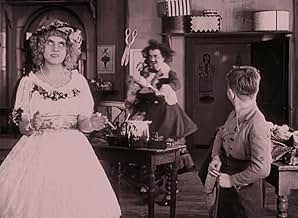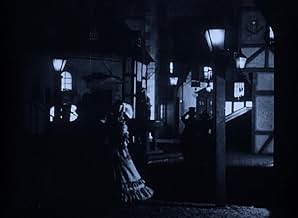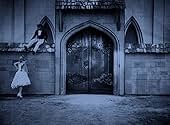IMDb RATING
7.4/10
2.6K
YOUR RATING
Forced into marriage by his uncle, a man decides to fool him by marrying a life-like mechanical doll instead.Forced into marriage by his uncle, a man decides to fool him by marrying a life-like mechanical doll instead.Forced into marriage by his uncle, a man decides to fool him by marrying a life-like mechanical doll instead.
Ernst Lubitsch
- Director in Prologue
- (uncredited)
Featured reviews
This comedy from the hands of Ernst Lubitsch in 1919 is a joyride through a number of imaginative sets and situations. Even though its artificiality if ever apparent, the movie makes it work by playing with the costumes and sets, to create a whimsical world where everything can happen.
Like other Lubitsch films the plot of this is build upon similar themes such as facade and identity. Although not my favourite of Lubitsch's films it hold a place in the top five. This movie is assured to put a smile on your face the whole way through, driven by Lubitsch's at times expressive directing.
Like other Lubitsch films the plot of this is build upon similar themes such as facade and identity. Although not my favourite of Lubitsch's films it hold a place in the top five. This movie is assured to put a smile on your face the whole way through, driven by Lubitsch's at times expressive directing.
I caught this on TCM, it is a completely captivating and delightful experience for all ages, so many layers in this story. Cannot recommend it enough for its period charm and generally kookiness.
However, the cast list here on IMDB is a mess due to faulty translations. "Dessen Frau" means "His Wife", and refers to Baron Chanterelle (chanterelles are a group of mushrooms, much eaten in Germany in late summer/autumn.) Similarly, "His Daughter" (Ossi, or The Doll) again refers to the Baron as her father. "The Briar" (!) should, I think, be The Friar; only in the film he is in fact the Abbot of the monastery, not merely a Brother. Wikipedia gets it all correct on its page about this film.
However, the cast list here on IMDB is a mess due to faulty translations. "Dessen Frau" means "His Wife", and refers to Baron Chanterelle (chanterelles are a group of mushrooms, much eaten in Germany in late summer/autumn.) Similarly, "His Daughter" (Ossi, or The Doll) again refers to the Baron as her father. "The Briar" (!) should, I think, be The Friar; only in the film he is in fact the Abbot of the monastery, not merely a Brother. Wikipedia gets it all correct on its page about this film.
All cinema is artificial, and there is no getting away from this no matter how much of a realist you try to be. And while authenticity and naturalistic performances are a necessity for drama, there are some types of picture in which a deliberate flaunting of artificiality is not only acceptable, it is a positive benefit.
By this point in his career, German comedy director Ernst Lubitsch had developed a unique brand of slapstick, the hallmark of which was absurdity and exaggeration. In Lubitsch's world, almost anything can happen, and often does. The stories he dreamed up with his regular collaborator Hanns Kraly were always whimsical and fairy tale-ish, but the Doll is perhaps their most fantastical of all. In it we have a lifelike mechanical doll, and a flesh-and-blood woman pretending to be the doll. Rather than go overboard trying to make this look as convincing as possible, Lubitsch takes things the other way, and stages the whole thing in a phoney and theatrical land, complete with wooden sets, painted backdrops and pantomime horses. In such a setting, the premise of the picture becomes workable.
Aside from this, the comic stylings of the early Lubitsch farces were becoming increasingly refined. As usual there are lots of jokes based around ridiculous numbers of people doing the same thing in unison, or the expressions of characters in reaction. Here Lubitsch shows the confidence to have many of these gags play out in long, unbroken takes, with hilarious results, such as the long shot of Lancelot being chased round the town by a huge gang of women, followed by his elderly uncle, followed by a servant with the uncle's medication. Often the careful placement of actors means our attention is drawn to the right spot at the right time, as oppose to overdoing a gag with a jolting cut. An example of this is the uncle's servant's very funny reaction to Lancelot's suggestion that the uncle get married. Lubitsch has the servant to one side of the screen, where it seems natural for him to be, but closest to the camera so his face is clear and we instantly notice when his expression begins to change.
As the eponymous doll, we have here another triumphant performance from Ossi Oswalda. While individual actors were used almost like cogs in Lubitsch's machine, there is no denying that Oswalda was surely a great comedienne in her own right. Here she shows impeccable control and timing, as she is forced to instantaneously snap in and out of being herself and acting as the doll. She also has a lot of fun pulling faces in this one. Honourable mentions go to Hermann Thimig, who is clownish enough to make a lead man in this silly setting, and Gerhard Ritterband, who despite being a youngster manages to steal every scene he is in. It's a shame these two did not have more distinguished screen careers, but of course it's worth bearing in mind that many of these players were more successful on the stage.
Speaking of which, it's possible that some viewers might be put off by the theatrical artifice of this picture. There is a rather depressingly naïve school of thought among some cineastes that film is film and theatre is theatre, and for film to make itself like theatre is to somehow straitjacket itself. But as we have seen, Lubitsch's creation of a self-confessed unreal world has given him greater freedom in staging his bizarre humour. Another German director, Fritz Lang, used a similar approach in his films of the 20s and early 30s albeit for a very different effect, whereby he created macabre and stylised art deco cities in which all kinds of comic-book adventures could take place. And in the Doll, when we see characters sleepwalking over rooftops or being carried away by a bunch of helium balloons, it is reminds me more than anything of the world of cartoons, in which the only limitation is the skills and imagination of the animators. With pictures like this, Lubitsch was really setting his genius free.
By this point in his career, German comedy director Ernst Lubitsch had developed a unique brand of slapstick, the hallmark of which was absurdity and exaggeration. In Lubitsch's world, almost anything can happen, and often does. The stories he dreamed up with his regular collaborator Hanns Kraly were always whimsical and fairy tale-ish, but the Doll is perhaps their most fantastical of all. In it we have a lifelike mechanical doll, and a flesh-and-blood woman pretending to be the doll. Rather than go overboard trying to make this look as convincing as possible, Lubitsch takes things the other way, and stages the whole thing in a phoney and theatrical land, complete with wooden sets, painted backdrops and pantomime horses. In such a setting, the premise of the picture becomes workable.
Aside from this, the comic stylings of the early Lubitsch farces were becoming increasingly refined. As usual there are lots of jokes based around ridiculous numbers of people doing the same thing in unison, or the expressions of characters in reaction. Here Lubitsch shows the confidence to have many of these gags play out in long, unbroken takes, with hilarious results, such as the long shot of Lancelot being chased round the town by a huge gang of women, followed by his elderly uncle, followed by a servant with the uncle's medication. Often the careful placement of actors means our attention is drawn to the right spot at the right time, as oppose to overdoing a gag with a jolting cut. An example of this is the uncle's servant's very funny reaction to Lancelot's suggestion that the uncle get married. Lubitsch has the servant to one side of the screen, where it seems natural for him to be, but closest to the camera so his face is clear and we instantly notice when his expression begins to change.
As the eponymous doll, we have here another triumphant performance from Ossi Oswalda. While individual actors were used almost like cogs in Lubitsch's machine, there is no denying that Oswalda was surely a great comedienne in her own right. Here she shows impeccable control and timing, as she is forced to instantaneously snap in and out of being herself and acting as the doll. She also has a lot of fun pulling faces in this one. Honourable mentions go to Hermann Thimig, who is clownish enough to make a lead man in this silly setting, and Gerhard Ritterband, who despite being a youngster manages to steal every scene he is in. It's a shame these two did not have more distinguished screen careers, but of course it's worth bearing in mind that many of these players were more successful on the stage.
Speaking of which, it's possible that some viewers might be put off by the theatrical artifice of this picture. There is a rather depressingly naïve school of thought among some cineastes that film is film and theatre is theatre, and for film to make itself like theatre is to somehow straitjacket itself. But as we have seen, Lubitsch's creation of a self-confessed unreal world has given him greater freedom in staging his bizarre humour. Another German director, Fritz Lang, used a similar approach in his films of the 20s and early 30s albeit for a very different effect, whereby he created macabre and stylised art deco cities in which all kinds of comic-book adventures could take place. And in the Doll, when we see characters sleepwalking over rooftops or being carried away by a bunch of helium balloons, it is reminds me more than anything of the world of cartoons, in which the only limitation is the skills and imagination of the animators. With pictures like this, Lubitsch was really setting his genius free.
"Die Puppe" aka "The Doll" ranks with "The Oyster Princess" as perhaps Lubitsch's most sublime film made during his German period. Both films are superior in many respects to the well-known but pallid historical drama, "Madame duBarry" aka "Passion" (also made in 1919). Lubitsch himself felt that way. In a letter he once submitted to his biographer Herman G. Weinberg, Lubitsch considered "Die Puppe" and "Oyster Princess" as his most outstanding comedies produced in Germany before he departed for Hollywood to make "Rosita".
An early, entrancing example of what Lubitsch would become years later, "Die Puppe" is a supremely funny and delightful silent burlesque, filled with the master's light, witty, and graceful touch. The setting is frothy and artificial and it anticipates Lubitsch's enchanting fairy tale musicals of the sound era.
"Die Puppe" is introduced by Lubitsch himself with an artificial cardboard. It is a fairy tale about of a young prince named Lancelot(Hermann Thimig) who flees from his uncle Baron von Chanterelle(Max Kronert) to avoid a marriage. He settles in a monastery. There, he meets several monks who persuade him to marry a human-like mechanical doll and give them his uncle's dowry. The doll-maker Hilarius (Victor Janson) agrees to Lancelot's interest in his newest doll, an exact replica of Hilarius' daughter Ossi (played by Ossi Oswalda herself). But there is a problem: The doll-maker's young apprentice (Gerhard Ritterband) accidentally breaks the arm of the doll and now it is up to Hilarius' daughter Ossi to impersonate the doll in order to cover it up. Lancelot takes the doll/Ossi to his uncle's castle, where some of Lubitsch's most inventive gags occur as Lancelot mistakes real Ossi for the doll. He actually falls in love with the doll/Ossi. And the wedding scenes alone are some of the funniest moments ever filmed.
If you are a fan of Lubitsch, "Die Puppe" is an essential viewing.
An early, entrancing example of what Lubitsch would become years later, "Die Puppe" is a supremely funny and delightful silent burlesque, filled with the master's light, witty, and graceful touch. The setting is frothy and artificial and it anticipates Lubitsch's enchanting fairy tale musicals of the sound era.
"Die Puppe" is introduced by Lubitsch himself with an artificial cardboard. It is a fairy tale about of a young prince named Lancelot(Hermann Thimig) who flees from his uncle Baron von Chanterelle(Max Kronert) to avoid a marriage. He settles in a monastery. There, he meets several monks who persuade him to marry a human-like mechanical doll and give them his uncle's dowry. The doll-maker Hilarius (Victor Janson) agrees to Lancelot's interest in his newest doll, an exact replica of Hilarius' daughter Ossi (played by Ossi Oswalda herself). But there is a problem: The doll-maker's young apprentice (Gerhard Ritterband) accidentally breaks the arm of the doll and now it is up to Hilarius' daughter Ossi to impersonate the doll in order to cover it up. Lancelot takes the doll/Ossi to his uncle's castle, where some of Lubitsch's most inventive gags occur as Lancelot mistakes real Ossi for the doll. He actually falls in love with the doll/Ossi. And the wedding scenes alone are some of the funniest moments ever filmed.
If you are a fan of Lubitsch, "Die Puppe" is an essential viewing.
People speak of the Lubitsch Touch first showing up in THE OYSTER PRINCESS, but that movie always struck me me as a a good romantic comedy, dimmed by changes in fashion, creaking a bit in age.
But this movie is the real thing: a silly story told with much flair and constant surprises. It begins with Lubitsch showing you a model of the set, like Penn and Teller showing you how they do the cup-and-ball trick, followed by a show that dazzles you: pantomime horses, venal monks and a little bit of E.T.A. Hoffman all fall under the thrall of Lubitsch and all of them, and the audience too, end up with smiles on their faces.
This movie is too good to more than hint at its wonders. If you have never seen a silent feature, see this one.
But this movie is the real thing: a silly story told with much flair and constant surprises. It begins with Lubitsch showing you a model of the set, like Penn and Teller showing you how they do the cup-and-ball trick, followed by a show that dazzles you: pantomime horses, venal monks and a little bit of E.T.A. Hoffman all fall under the thrall of Lubitsch and all of them, and the audience too, end up with smiles on their faces.
This movie is too good to more than hint at its wonders. If you have never seen a silent feature, see this one.
Did you know
- TriviaAt one point Lancelot takes a heart out of the leg of his pants. This is an allusion to the German expression 'Das Herz ist mir in die Hose gerutscht' (my heart slid into my pants) which is equivalent to 'to have one's heart in one's boots'.
- GoofsLancelot shouts his alarm to a monk that he is being pursued by "40 women". However, about 20 women are seen on screen.
He says this because the butler earlier had announced "Forty women at the door!" It's an estimate as it's doubtful the butler made an individual count. Also, there is no "requirement" that all referenced individuals must appear on screen.
- Quotes
Baron von Chanterelle: [on Lancelot's wedding night] Do you need any more pieces of advice?
Lancelot: No thanks, I have an instruction manual.
- ConnectionsFeatured in Cinema Europe: The Other Hollywood (1995)
- How long is The Doll?Powered by Alexa
Details
- Release date
- Country of origin
- Languages
- Also known as
- Nürnbergerdockan
- Production company
- See more company credits at IMDbPro
- Runtime
- 1h 6m(66 min)
- Sound mix
- Aspect ratio
- 1.33 : 1
Contribute to this page
Suggest an edit or add missing content






























